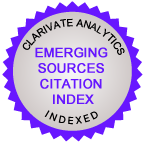Casos problemáticos para la teoría del documental
-
Sergio José Aguilar Alcalá
 sergio.aguilaralcala@gmail.com
sergio.aguilaralcala@gmail.com
Descargas
Resumen
Este trabajo propone que un documental no se define en función de la relación que su contenido tenga con el mundo donde se proyecta el documental, es decir, no importa si su contenido es “verdadero”, porque un documental no es un documental porque su contenido sea verdad. De este modo, se puede escapar la peligrosa dicotomía verdadero/falso y entender apropiadamente los siguientes casos problemáticos: el documental en tiempo condicional, el documental de teoría conspirativa, el documental de propaganda militar, el documental animado y la pornografía. A partir de la brecha entre enunciado y enunciación propuesta por Jacques Lacan en el Seminario XI, puede estudiarse al documental a profundidad como un compromiso con la enunciación más allá del enunciado. En tanto casos problemáticos, son cruciales no sólo para entender la ficción y la no ficción, sino también para entender cómo le damos sentido al mundo y cómo ponemos los límites de la construcción discursiva de la verdad.
Palabras Clave
Artículos similares
- Marcelo Borrelli, Voces y silencios: La prensa argentina durante la dictadura militar (1976-1983). , Perspectivas de la Comunicación: Vol. 4 Núm. 1 (2011): Enero - Agosto
- Montserrat Vidal-Mestre, Alfonso Freire-Sánchez, Maria Fitó-Carreras, El discurso periodístico y los elementos de transmisión del mensaje en el pódcast y la docuserie audiovisual del fenómeno true crime. El caso de El asesino de la baraja , Perspectivas de la Comunicación: Vol. 17 (2024): Enero - diciembre
- Ramon Ramirez Ibarra, Estado, libertad e ideología: narrativas digitales de la nueva derecha para América Latina , Perspectivas de la Comunicación: Vol. 16 Núm. 1 (2023): enero - junio
- Ionio Alves da Silva, Columna de Castello. La opinión en el periodismo brasileño y el golpe militar de 1964. , Perspectivas de la Comunicación: Vol. 5 Núm. 2 (2012): Setiembre – Diciembre
- Emma Torres-Romay, Silvia García-Mirón, El debate político en el contexto local. El caso de las elecciones municipales de 2019 en Galicia. , Perspectivas de la Comunicación: Vol. 14 Núm. 1 (2021): enero - junio
- Lucas Emanuel Hirch, Vanesa Mariel Díaz, Entre el olvido y la memoria. La construcción discursiva de las víctimas de la última dictadura militar argentina en el diario Puntal en la década del ´90. , Perspectivas de la Comunicación: Vol. 3 Núm. 2 (2010): Setiembre – Diciembre
- Evangelina Máspoli, Legitimación, discurso y valoración del accionar de las Fuerzas Armadas durante la última dictadura militar argentina. Un estudio desde la mirada de un periódico local: “La Verdad” de Junín, 1976 , Perspectivas de la Comunicación: Vol. 7 Núm. 1 (2014): Enero - Agosto
- Eduardo Raíces, De la Argentina Secreta a la emergencia juvenil. Análisis cultural y política en la revista peronista Línea (1980-1982) , Perspectivas de la Comunicación: Vol. 13 Núm. 2 (2020): julio - diciembre
- Jose Luís Piñuel Raigada, María Yolanda Martínez Solana, Teresa Martín García, Una exploración del capital cognitivo ante discursos del odio por racismo , Perspectivas de la Comunicación: Vol. 15 Núm. 2 (2022): julio - diciembre
- Arthur Ituassu, Letícia Capone, Leonardo Magalhães Firmino, Vivian Mannheimer, Felipe Murta, Comunicación política, elecciones y democracia: las campañas de Donald Trump y Jair Bolsonaro , Perspectivas de la Comunicación: Vol. 12 Núm. 2 (2019): julio - diciembre
También puede {advancedSearchLink} para este artículo.
Descargas
Publicado
Cómo citar
Número
Sección
Licencia
1. Política propuesta para revistas que ofrecen acceso abierto
Aquellos autores/as que tengan publicaciones con esta revista, aceptan los términos siguientes:
- Los autores/as conservarán sus derechos de autor y garantizarán a la revista el derecho de primera publicación de su obra, el cuál estará simultáneamente sujeto a la Licencia de reconocimiento de Creative Commons Reconocimiento (CC -BY 4.0)
 que permite a terceros compartir la obra siempre que se indique su autor y su primera publicación en esta revista.
que permite a terceros compartir la obra siempre que se indique su autor y su primera publicación en esta revista. - Los autores/as podrán adoptar otros acuerdos de licencia no exclusiva de distribución de la versión de la obra publicada (p. ej.: depositarla en un archivo telemático institucional o publicarla en un volumen monográfico) siempre que se indique la publicación inicial en esta revista.
- Se permite y recomienda a los autores/as difundir su obra a través de Internet (p. ej.: en archivos telemáticos institucionales o en su página web) antes y durante el proceso de envío, lo cual puede producir intercambios interesantes y aumentar las citas de la obra publicada. (Véase El efecto del acceso abierto).











